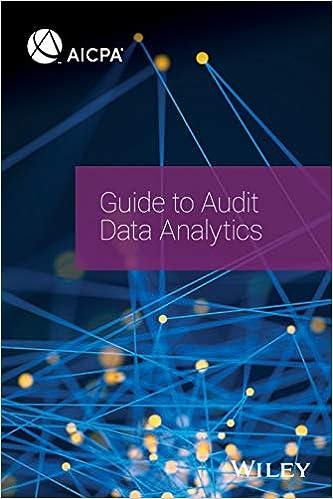Question
1.. The amount of cash paid out for overhead each period does not equal the total overhead costs incurred during the period because: A.overhead expenses
1.. The amount of cash paid out for overhead each period does not equal the total overhead costs incurred during the period because:
A.overhead expenses rarely require cash payments.
B.overhead expenses only require cash payments for factory rent.
C.overhead expenses only require cash payments for indirect materials.
D.depreciation expense does not require a cash payment.
E.None of the answer choices is correct.
2. Which of the following best describes the selling and administrative budget?
A. A series of budget schedules outlining the organization's plans for the upcoming period.
B.An estimate of cash expenditures for long-term assets.
C.An estimate of all operating costs other than production costs.
D.A budget that is based on sales projections plus an estimate of desired ending finished goods inventory less beginning finished goods inventory.
E.None of the answer choices is correct.
3. When preparing a production budget, the desired ending finished goods inventory for the first period is:
A.the beginning finished goods inventory for the second period.
B.always the same as the beginning finished goods inventory for the first period.
C.not used in this budget.
D.always less than the beginning finished goods inventory for the second period.
E.None of the answer choices is correct.
4. Freeman Company plans to sell 65,000 units in June and 72,500 units in July. Freemans poli-cy is to keep 30% of the next month's sales in ending inventory. If the ending inventory in May was consistent with this policy, how many units should be produced in June?
A.86,750 units
B.106,250 units
C.67,250 units
D.62,750 units
E.None of the answer choices is correct.
5. All of the following appear on the direct materials purchases budget except:
A.units to be produced.
B.projected sales in units.
C.quantity of direct materials to be purchased.
D.quantity of desired direct materials ending inventory.
E.None of the answer choices is correct.
6. According to the Business in Action Moving from Spreadsheets to Intranet Budgeting, which of the following is not an advantage of Intranet budgeting?
A.Intranet budgeting minimizes or eliminates the uploading of Excel spreadsheets.
B.Intranet budgeting saves input time.
C.Intranet budgeting provides real-time reports.
D.Intranet budgeting eliminates technology support.
E.None of the answer choices is correct.
7. Which of the following best describes a production budget?
A .A budget that is based on sales projections plus an estimate of desired ending finished goods inventory less beginning finished goods inventory..
B.An estimate of all production costs, other than direct materials, necessary to achieve a de-sired level of production.
C.A short-term budget that focuses on the daily operations of the organization.
D.A series of budget schedules outlining the organization's plans for the upcoming period
E.None of the answer choices is correct.
8.Establishing a sales budget that underestimates likely sales will have no effect on materials and labor in a production process.
| A.True | |||
| B.False 9. A budget committee is primarily responsible for overseeing the budget process and approv-ing the master budget.
|
Step by Step Solution
There are 3 Steps involved in it
Step: 1

Get Instant Access to Expert-Tailored Solutions
See step-by-step solutions with expert insights and AI powered tools for academic success
Step: 2

Step: 3

Ace Your Homework with AI
Get the answers you need in no time with our AI-driven, step-by-step assistance
Get Started


